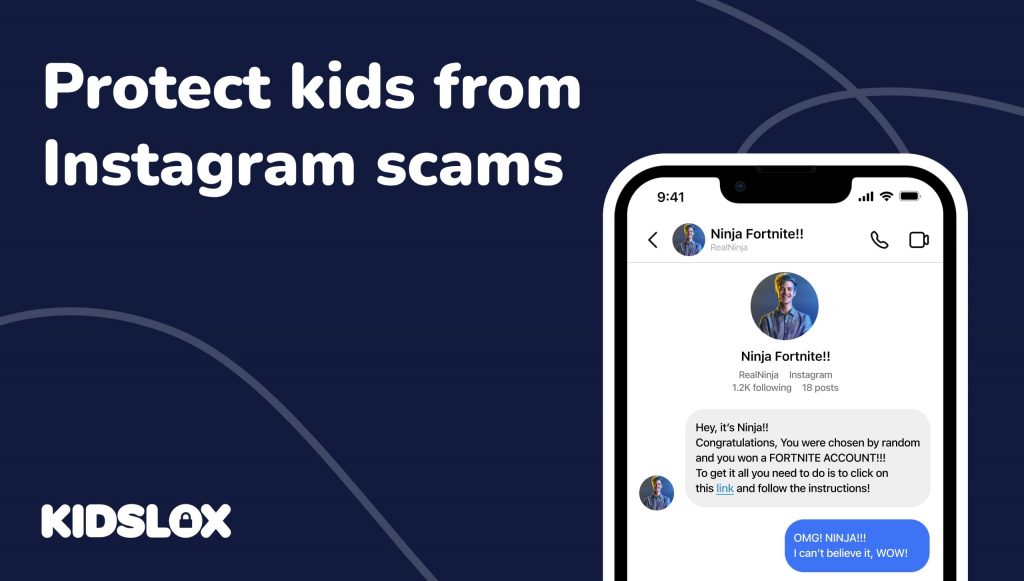How to spot an Instagram scam and protect your family.
If you’re on Instagram, then you probably don’t need to go much further than your ‘requested’ message inbox to see how common scams are on the popular social media platform.
From romance, to crypto and ambassador scams, there are multiple ways for you to get scammed on Instagram.
In this Guide To, we look at some of the most common scams to watch out for, how they work and what you can do to protect yourself and your family from becoming an Instagram scam victim.
The most common Instagram scams to watch out for
Instagram ambassador scams
Young and old, devotees of Instagram know that ambassadors, or Instagram influencers as they’re often known, are in every corner of the app. Whatever your hobby, there’s likely to be an Instagram ambassador that will appeal to your interests.
The ambassadors themselves aren’t the problem, but fraudsters can use their influence and appeal to trick you into thinking they’re genuine.
Typically the scam account will use a celebrity image, or glamorous imagery to reel in its victims and then promote activities like fake deals, investment opportunities or competitions to lure you in.
Sometimes a celebrity, influencer or Instagram ambassador has been hacked and the scammer uses the account to trick their fans.
How to avoid the Instagram scam? Never give our personal information online and remember, just because an account has a large amount of followers doesn’t make it legitimate.
Instagram crypto scams
Crypto and Instagram money scams are on the rise across the app – so much so that the U.S Federal Trade Commission (FTC) reached out to Meta (owner of Facebook, Instagram and WhatsApp) to question what the company was doing to help protect its users from them.
These Instagram crypto scams can be incredibly sophisticated and hard to detect. A scammer will pose as a credible investor or popular online figure and curate a large and legitimate appearing following. They will then strike up a conversation with victims and offer special deals or tips on investments, leading the victim to click on links or invest a little bit of money with the promise of a big return.
Sometimes they will mimic legitimate trading sites behind hidden links, making it very hard for the victim to know that they have been scammed until it’s too late.
How to avoid the Instagram scam? Never take investment advice online, buy Bitcoin or other cryptocurrencies through Instagram and always speak to a qualified financial expert before parting with your cash.
Instagram email scams
Phishing attacks are another common Instagram scam. A victim may receive an email letting them know that Instagram requires verification for something. The emails might relate to identity checks, granting access to a special offer or version, or even to achieve a prized ‘blue tick’.
Once the scam victim clicks the link, they’re directed to a site that looks like Instagram and they’re asked to provide their password. Once the Instagram scammer has this information, they seize control of the account and blackmail the owner for cash. If they don’t receive funds they will then delete the account.
How to avoid the Instagram scam? Always be wary of clicking links. Never trust an email from Instagram unless you have specifically requested one, and do not enter security information like passwords. For extra security, set up two factor authentication to protect yourself from scammers and hackers.
Sugar daddy and sugar momma Instagram scams
As sweet as the names sound, there’s nothing nice about these types of romance Instagram scams. A sugar daddy or sugar momma refers to a (usually) older person who will provide their ‘sugar baby’ with money and gifts. Sounds too good to be true? That’s because it is.
The sugar daddy scammer will usually have a convincing profile and will work to get their victim’s trust by appearing friendly, even showing pictures or testimonials from other satisfied sugar babies.
Once you engage with them, they will then ask for a token of your loyalty, which might be to send money or add cash to prepaid or gift cards. Once you do this, the sugar daddy or Instagram sugar momma scammer disappears, and so does your cash.
How to avoid the Instagram scam? Never engage with strangers online or send cash in any form. If something sounds too good to be true, that’s because it is.
Instagram DM (direct message) scams
Most scammers will contact potential victims through the DM or ‘direct message’ function on Instagram. This isn’t just the case for users with a public profile either. You can receive messages from people you don’t know on Instagram, which are then sometimes filtered into a ‘request’ or hidden inbox in your account.
While there may be genuine friends or contacts who end up in the request inbox, it’s always best to exercise caution. You may find yourself added to spammy group chats where various crypto scams and multi-level-marketing (MLM) scams are being shared.
How to avoid the instagram scam? Check the inbox for spam regularly and block and delete unwanted contact and report anything suspicious you see or feel might be a scam to Instagram.
Instagram romance scams
Instagram romance scams are common and just one of the many ways that scammers will try and exploit lonely people online.
These romance scammers will approach innocently, perhaps by building a rapport with their victims in the comment section of an Instagram post. They use this to build trust with their victim, and move into their DMs. From there they tighten their grip on their victim through manipulative tactics like being a shoulder to cry on, offering advice and sharing their own experiences and ‘secrets’.
As time goes on the ‘relationship’ becomes more intimate and the romance scammer may request nude or inappropriate content as a way of showing commitment. Once they receive this the interaction can become nasty, using the pictures as a way of blackmailing their victim into giving more or sending money.
Another way that the Instagram romance scam works is by asking for help and support. The scammer will ask their victim for money to buy tickets to meet them, or perhaps to get through a tough time at home.
How to avoid the Instagram scam? Never give personal information, intimate photographs or money to someone you don’t know in person. Instagram romance scams can be incredibly sophisticated and are designed to play on their victim’s emotions and insecurities.
Instagram hacking scams
One of the trickiest types of scam to watch out for on Instagram is the hacking scam. Once a scammer gains access to their victim’s account – typically by using the phishing methods outlined earlier, they can abuse the legitimacy of the hacked account to trap others.
Once a scammer gains access to an account they will then message that person’s followers to continue the scam. They may ask for money to help them out of a tricky situation, or even use the account to extract passwords or other valuable information out of their victims.
How to avoid the Instagram scam? If your friends or people you follow message you out of the blue and ask for help or money, tread with caution. Always call the friend in question to check that it’s really them, and never send money to anyone attempting to blackmail you.
Instagram scams for money
Aside from the suspect crypto investment schemes we discussed earlier, there are plenty of other shady cash related Instagram scams to watch out for.
These include fraudulent sellers offering too good to be true last minute deals and everything must go sales. These scammers go to long lengths to create payment pages that look authentic, but actually steal from their victims.
How to avoid the Instagram scams. If you’re shopping on Instagram, always use the official ‘shop’ feature or go on the company’s website to make the sale by visiting through a separate tab or browser. Other ways that scammers will try and extract cash from their victims on Instagram, include fake Venmo, Zelle and CashApp scams so never transfer cash to someone you don’t know. If a deal seems too good to be true it usually is, so buyer beware!
Help! I got scammed on Instagram. What can I do about it?
If you fall victim to an Instagram scam, you’re not alone. According to FTC data, almost 100,000 people reported nearly $770 million in losses to social media fraud. And, as these schemes get more sophisticated, they become harder to identify – even finance professionals have fallen victim to Instagram scams.
So what can you do if it happens?
First up, report it to Instagram and check out the official guidance on Instagram’s guidelines pages. If the scam involves criminal activity, make sure you report it to the relevant authorities too. In some circumstances, your bank may be able to help you if you are financially scammed, so it’s always worth speaking to them too.
What can I do to protect my kids from Instagram scammers?
Children and teens are especially vulnerable to Instagram scams as they lack the real world experience to spot suspicious activity. Young people may also find it easier to have their judgment clouded by exciting offers, or trust the word of people they admire like Instagram ambassadors and influencers.
- Ensure privacy settings are on
If your child has an Instagram account, ensure they can’t be contacted by people they don’t know by enabling this security setting. Instagram can stop adults from contacting under 18s if they don’t know them so make sure this is all in place on your child’s device. - Don’t click links you don’t trust
Teach your child how to avoid clicking on potential scam links by never clicking on suspicious looking content – even if it comes from a friend. Show them ways they can check the legitimacy of things by asking them to contact friends via another method of messaging to ensure the link is something safe. - Don’t follow or accept follow requests from people you don’t know
Your teens will want to follow their favorite celebrities and influencers, and that’s OK, but ensure they understand that people can impersonate these accounts and try and exploit them. When it comes to other users, restrict followers to people they know in real life. - Never give out personal or identifiable information
If your teen has their own account, then you’ll most likely have had the conversation about protecting yourself against fraud online, but it’s always a good idea to keep checking in with them about the things they’ve seen on Instagram and ensure they’re not being tempted by sophisticated scams.
Teach your child that even the smallest titbit of information can be used to help a scammer get to what they want, so privacy is paramount when it comes to sharing online. - Password protection and two step authentication
Ensure that your teen understands the importance of keeping passwords safe and updated regularly. Enable two-step authentication on all their social accounts to give that added layer of security if they do engage with a scammer. - Download parental controls
Give your family extra support when it comes to avoiding Instagram scams by downloading parental controls like Kidslox to keep everyone safe. Kidslox can help by stopping purchases through your child’s device, monitor their activity and send you screenshots of what they’re doing, so you can check if the people they’re interacting with are genuine.
You can also set time limits on apps and shut them down when time’s up, which helps everyone to create healthier habits with their technology usage.
Instagram scams are constantly evolving and it’s essential to remain vigilant to suspicious activity. Keep up to date on what’s happening online, and share information with family and friends to keep those you care about safe from being scammed.





